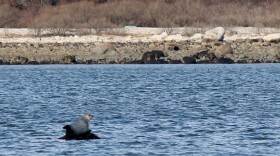The impacts of climate change and environmental concerns are shared across our region, but when it comes to addressing those issues, the New England states can have strikingly different policies. We tell stories on these topics every day and work together on special series.
In the summer of 2023, we looked at the impacts of extreme weather in our series Beyond Normal. And each year around Earth Day, we present a series of regional climate change stories with a different theme. For our 2024 series, we looked at how climate change is impacting our homes.
-
Mycologist Larry Millman is on a mission to record the fungi at Fresh Pond Reservation in Cambridge. He's one discovery away from cataloging his 400th species.
-
Vineyard Wind, a large and nearly complete offshore wind farm near Massachusetts, says the Trump administration violated the law when it ordered a construction pause in December.
-
It’s been a little over a hundred years since fishermen were free to catch shellfish in the Boston Harbor. But now, the state has declared that shellfish from parts of the harbor can be safely caught and eaten again.
-
Residents in western Massachusetts towns that surround the Quabbin Reservoir want better financial compensation and a bigger role in making decisions related to the water resource.
-
Seals and migratory birds are the stars of the show on Long Island Sound.
-
A winter wildlife cruise with Norwalk’s Maritime Aquarium gives folks a closer look at seals, the only marine mammal to make an annual visit to the Sound.
-
The ruling hands a temporary victory to developers involved in an offshore project intended to power more than 300,000 homes in Connecticut and Rhode Island.
-
Supporters say making public agencies dim outdoor lights will prevent disturbing wildlife and preserve Maine's dark night skies.
-
Outfitted with a long aluminum wire, this helicopter carries eight rotating saw blades to cut trees along a transmission corridor from East Haddam to Middletown.
-
More than a quarter of Connecticut's plant and wildlife species need more conservation research due to declining populations, threats, cultural importance or lack of data.










